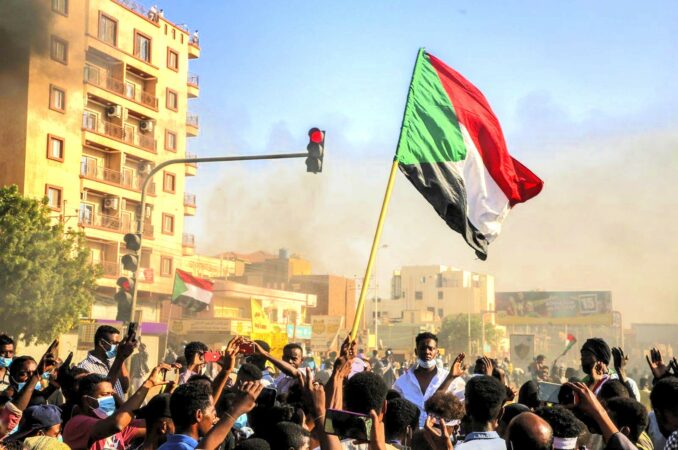Popular struggle challenges Sudan ‘agreement’
By Carlos Lopes Pereira
The author, a veteran of the liberation movement in Guinea and Cape Verde, is a regular contributor of articles on Africa to Avante, the weekly newspaper of the Portuguese Communist Party. This article was published Nov. 25. Translation: John Catalinotto.

Popular protests defy tear gas, bullets, Nov. 13, Khartoum, Sudan.
Sixteen-year-old Yusef Abdelhamid was shot dead by police while he was participating in a protest against the coup forces on Sunday, Nov. 21, in Omdurman, twin city of Sudan’s capital Khartoum, on the banks of the River Nile. The Sudan Doctors Committee revealed that the young man was the 41st fatal victim of repression since the Oct. 25 coup led by General Abdel Fattah al-Burhan.
The situation is complex in Sudan, one of Africa’s largest countries by area.
Almost a month after the coup that overthrew the civilian-military transitional government, the coup generals put the ousted prime minister, Abdalla Hamdok, who had been under house arrest since the coup, back in charge of the executive.
Al-Burhan proclaimed himself head of the armed forces and president of a reconfigured Sovereign Council, the highest authority until elections, scheduled for 2023. The alliance of political parties, associations and popular organizations that supported the previous cabinet, overthrown by the Oct. 25 coup, rejected the deal al-Burhan imposed on Hamdok. As many as 10 ministers of the toppled transitional government, who had been arrested but have since been released, have resigned from their posts.
The [anti-coup] Forces of Freedom and Change consider the agreement a “betrayal.” The Association of Professionals, another of the driving forces behind the protests, has expressed its “total and complete” rejection of the pact Hamdok signed. Hamdok is an economist favored by some Sudanese sectors, Western governments and organizations such as the International Monetary Fund.
The agreement provides for the release of political prisoners and the investigation of crimes committed by security forces over the past month, with dozens of people killed and numerous wounded. Nevertheless, just as the coup officers and the reappointed head of the “government of technocrats” were signing the agreement, police were repressing thousands of protesters with tear-gas grenades near the gates of the presidential palace in the capital. The protesters were demanding the return of civilians to power.
In December 2018 the rising price of bread sparked popular protests in Sudan against poverty and unemployment, with thousands on the streets in Khartoum and other cities. In the middle of the following year, under pressure from the demonstrations, the military ousted President Omar al-Bashir, who had been in power for 30 years.
Negotiations between democratic political organizations and the leaders of the armed forces followed, resulting in a civilian-military transitional government, overthrown a month ago and now partly restored by al-Burhan.

